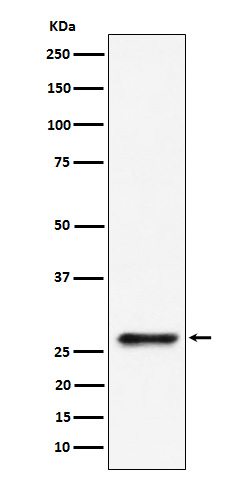
| WB | 咨询技术 | Human,Mouse,Rat |
| IF | 咨询技术 | Human,Mouse,Rat |
| IHC | 咨询技术 | Human,Mouse,Rat |
| ICC | 技术咨询 | Human,Mouse,Rat |
| FCM | 咨询技术 | Human,Mouse,Rat |
| Elisa | 咨询技术 | Human,Mouse,Rat |
| Aliases | CGI 97; sbds; SDS; SWDS;;SBDS |
| WB Predicted band size | 29 kDa |
| Host/Isotype | Rabbit IgG |
| Antibody Type | Primary antibody |
| Storage | Store at 4°C short term. Aliquot and store at -20°C long term. Avoid freeze/thaw cycles. |
| Species Reactivity | Human,Mouse,Rat |
| Immunogen | A synthesized peptide derived from human SBDS |
| Formulation | Purified antibody in PBS with 0.05% sodium azide,0.05% BSA and 50% glycerol. |
+ +
以下是关于SBDS抗体的3篇参考文献,简要整理如下:
---
1. **文献名称**:*The Shwachman-Bodian-Diamond syndrome protein regulates translation and ribosome homeostasis*
**作者**:Austin et al.
**摘要**:研究揭示了SBDS蛋白通过与核糖体结合,参与调控真核生物翻译过程及核糖体稳态。通过抗体验证发现,SBDS缺失会导致核糖体组装异常,影响细胞增殖和造血功能。
2. **文献名称**:*SBDS mutations impair ribosome maturation and cytoplasmic stress responses in Shwachman-Diamond syndrome*
**作者**:Finch et al.
**摘要**:该研究利用SBDS特异性抗体,发现SBDS基因突变患者的细胞中核糖体成熟受阻,且对氧化应激等环境压力的适应性下降,解释了Shwachman-Diamond综合征(SDS)的病理机制。
3. **文献名称**:*Structural and functional analysis of the SBDS protein in mitochondrial function*
**作者**:Calvo et al.
**摘要**:通过免疫沉淀和Western blot技术,证实SBDS蛋白不仅参与核糖体功能,还与线粒体代谢相关。抗体实验显示SBDS缺陷会导致线粒体膜电位异常,提示其多细胞器调控作用。
---
如需具体文献来源或补充信息,可进一步提供数据库检索关键词(如PubMed ID)。
**Background of SBDS Antibodies**
SBDS (Shwachman-Bodian-Diamond syndrome) antibodies are tools used to study the SBDS protein, encoded by the *SBDS* gene, which is linked to Shwachman-Diamond syndrome (SDS), a rare autosomal recessive disorder. SDS is characterized by bone marrow failure, exocrine pancreatic dysfunction, and skeletal abnormalities. Mutations in *SBDS* disrupt ribosome biogenesis, genomic stability, and cellular stress responses, contributing to SDS pathophysiology and predisposing patients to leukemia.
SBDS antibodies are primarily utilized in research to detect and analyze SBDS protein expression, localization, and interactions. They aid in elucidating the protein’s role in ribosome assembly, RNA processing, and mitotic spindle regulation. Immunohistochemistry, Western blotting, and immunofluorescence are common applications.
These antibodies also support clinical diagnostics, helping confirm SDS in patients with suspected mutations. However, challenges remain in ensuring antibody specificity due to the protein’s low abundance and structural homology with other proteins. Recent studies explore SBDS’s involvement in cellular pathways beyond ribosome biology, such as DNA repair and telomere maintenance, expanding its relevance in cancer and aging research.
Overall, SBDS antibodies are critical for advancing understanding of SDS mechanisms and developing targeted therapies. Their utility spans basic research, diagnostic validation, and translational studies, underscoring their importance in both biomedical and clinical contexts.
×